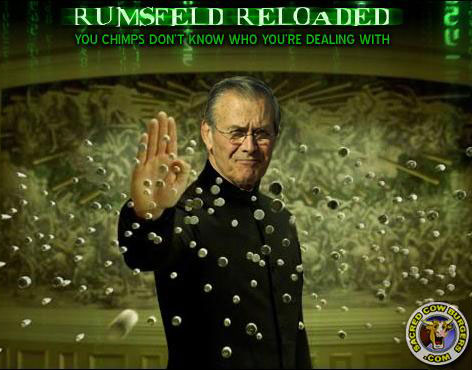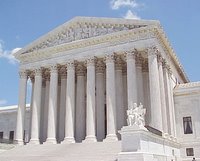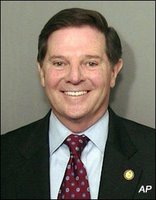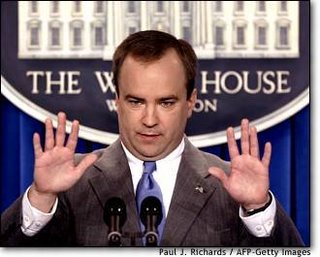Saturday, April 29, 2006
Party of the American Dream

Democrats are the party of the American Dream. They stand for higher quality, better funded education – to help give citizens' upward mobility a kick-start. They believe in small-business-friendly policies – to foster economic growth. They believe in keeping government regulation out of your private life – to prevent undue restrictions on how you choose to live. And just in case, Democrats are there to catch you if you fall – with concrete programs like Social Security and long-term visions like universal healthcare. Democrats want to help the little guy become the big guy and they want to help the big guys keep America strong.
100 words. The entire above paragraph is just 100 words, and yet neither Howard Dean, nor Nancy Pelosi, nor Harry Reid, nor Russ Feingold, nor any Democrat seems to be able to rally his or her colleagues around a consistent vision. The Republicans have been sucessfully toting ‘tax relief’ and ‘family values’ for years. These four words have caused the Democrats world of trouble. The Republican vision is not really any simpler than the Democratic one, just better packaged. I think few Democrats would disagree with the above paragraph, yet getting them to articulate it succinctly has proven unreasonably difficult. But it’s very simple: Democrats are the party of the American Dream.
Democrats realize we are in the middle of a war in Iraq. In 2004, Kerry consented to allow the campaign to be about the war on terror. But while the war is important, it does not and cannot define the entirety of this country’s governance. By squandering money abroad and fumbling funding at home, the Republicans have set the ball, but the Democrats need to choose their swing carefully. Midterm elections should not be about the war on terror or even about tax cuts or raises. They probably shouldn’t even be about the pervasive Republican culture of corruption. Democrats cannot afford to fight another battle on Republican territory. They must bring the struggle back home to Democratic strongholds: healthcare, the environment, honest and open government, and providing the nation with the economic safety net they need to take the risks necessary to realize the American dream.
Since Bush’s election in 2000, the Republicans have suffocated the American Dream. Low-income families have only a 1% chance of reaching the top 5% of American income distribution compared to 22% for high-income families. 43 years after Dr. Martin Luther King told this nation of his dream, race still plays a dominant factor in whether or not a child will realize the American dream.
This is the fight the Democrats should be fighting. This is the fight they can win.
Thursday, April 27, 2006
The Lost Art of the Protest

The Protest is a dying art - not because citizens around the world have forgotton how to speak out, but because government has forgotten how to listen. After the right to vote, the right to free speech is perhaps the next most essential right of citizens in a free democracy. But governments seem to ignore protesters entirely or merely brush them aside.
This week, Police arrested a group of 24 'grannies' who entered a military recruiters office to sign up. When a Fallun Gong protester screamed at Bush and Hu Jintao at the state welcome, she went completely ignored. Police also arrested 3 Stanford students for peacefully protesting President Bush's meeting at the Hoover institution on campus. They stood in the road (on private property) and were haulled away by police in riot gear. See the video here. But at least we are only needlessly arresting our citizens. Egyptian police arrested and beat their citizens for suporting judges who are standing trial for objecting that the executive branch is the sole watchdog for electoral corruption.
I've complained before that declaring an undefined category of "enemy combatants" and holding Americans and foreigners without benefit charge or trial is remarkably unconstitutional. It is an abuse of executive power, as is arresting people for convenience. But how do we solve this problem? Granted, unwarrented arrests are nothing compared to the plight of enemy combatants, or the vicitms of police riots in Egypt, but the fact remains - in the abscence of a Judiciary willing to stand up and fight for citizen's rights, executive abuses of power, both small and large, go unchecked.
American Police officers are doing better than Egyptian officers or Chinese government, but a growing American sentiment that condones arresting peaceful protestors is more than a little bit disconcerting. It is not ok to arrest protesters just to try and silence them. Americans have the right to speak out without being thrown in jail. And at a 32% approval rating, maybe Bush could benefit from some of the things these people have to say
FRIDAY APRIL 28TH -- Speaking of Protests...
Five Members of Congress publicly protest the genocide in Darfur. They were arrested.
Wednesday, April 26, 2006
Arnold Running Upstream

Even George W. Bush has admitted publicly that our country is addicted to oil. He announced a campaign to make renewable energy a viable and sustainable alternative, but Governor Schwarzenegger seems determined to let the bandwagon run him over - he just accepted $2 million dollars from big oil companies. A Governor who campaigned against special interest money just accepted $2 million from one of the most dangerous special interests facing our nation today.
I was actually proud that Bush finally capitulated to rising oil prices, launching an investigation into price gauging and temporarily halting deposits to the national reserve. These may only be superficial remedies, but at least the President of the United States has found the courage to use his power to stir the currents of policy change in the right direction. Schwarzenegger, on the other hand, launched a similar investigation and only days later accepted a enormously 'generous' campaign contribution from the same people he said he would investigate. If you ask me, this significant undercuts his credibility - whatever he had left.
There was once a time when Arnold refused to meet with Bush because W's poll ratings were so toxic that Arnold didn't want to infect his own administration. At this point, Arnold might actually be able to learn something.
Now I know this information is something you might be able to find in any given California newspaper, and normally I try to avoid stories when I don't have much to add in the way of interpretation, but The Governor has been trying to keep a low profile recently. He's been biding time after an incredibly politically damaging special election, and as the 2006 election approaches in November, I think we need to be reminded that even when he's laying low, Arnold's day-to-day actions are no less subversive then when he makes the front page.
Tuesday, April 25, 2006
Snow in May

Rumors in Washington scurry about with lives of their own, yet as Scott McClellan's resignation begins to fade into the distance, reports that Fox News correspondent Tony Snow may accept a position as the new Press Secretary seem increasingly likely. Moreover, reports of Snow's bargaining power have bubbled to the surface. Many have reported that Snow predicated his acceptance of the position on being given more latitude to actually craft the President's message rather than merely act as the administrations mouthpiece.
Well, my initial inclination was to gawk at how this administration was extending its hand to someone outside the administration. Knowing Bush's proclivity for cronyism, many originally expected an internal promotion. What I quickly realized, however, is that Mr. Snow is a crony. In 1991 he served as chief speechwriter and deputy communications director for Bush Bush 41. Bolton wants to give more weight to White House Communications and setting up a Press Secretary with more powers is a good step, but don't be fooled, Snow has some practice with this.
As a side note, however, I would question Snow's talent. Here is the opening of Bush 41's 1992 State of the Union Address,
I mean to speak tonight of big things, of big changes and the promises they hold and of some big problems and how together we can solve them and move our country forward as the undisputed leader of the age.Wow. That is some pretty bland speech. I know we don't always have the most articulate Presidents, but speechwriters traditionally pull out all the stops to make the President's words glimmer for inaugural addresses and States of the Union (just think of Bush 41's inaugural address and "1000 points of light" written by Snows predecessor).
We gather tonight at a dramatic and deeply promising time in our history,and in the history of man on earth. For in the past 12 months, the world has known changes of almost biblical proportions. And even now, months after the failed coup that doomed a failed system, I am not sure we have absorbed the full impact, the full import of what happened.
Many have said Snow's job title will change, but not his job description - he has been and will remain a mouthpiece for the administration, but this is simplistic. I am sure that both pubilcly and privately snow has been a Bush supporter, but now he will actually have a hand in forming the President's message. This is fairly significant change. The bottom line is Snow represents a new, yet experienced face, but don't look for newly shining rhetoric. If the above SoTU is any indication, this administration seems quite comfortable and complicit in its bumbling, inarticulate public face.
Monday, April 24, 2006
Victims at Home and Victims Abroad

Two Thousand Six Hundred and Seventy. Two Thousand Six Hundred and seventy. 2,670. Any way you write it, it's an ominous number. This is how many American soldiers have died in the War on Terror. Are these trumped up numbers by some anti-war liberal group? No. They come from the Department of defenses official casualty report. More than 2000 American Soldiers have died since President Bush stood on the Deck of the USS Abraham Lincoln to declare "Mission Accomplished" - an average of more than 2 soldiers dieing every day we keep our troops in harm's way.
Even so, Bush pledged to keep American troops in Iraq and Afghanistan through the end of his term come hell or high water. Not only does he want to "Stay the Course," He isn't even looking for an exit strategy anymore.
Perhaps this would be an appropriate price to secure American safety at home, but the longer our troops remain in Iraq, the more vulnerable American soil becomes. Bush has called up over 400,000 reserve troops - not the regular volunteer army, but the reserves. Many of these reservists are policemen, firefighters and paramedics.
Only after shipping off 8000 Louisiana and Mississippi National Guardsmen to Iraq did he realize that perhaps we need some security forces at home too. When Hurricane Katrina devastated the Gulf Coast, Louisiana and Mississippi were shorthanded - by 8000. Yet, the Administration refused to allow any troops to come back early to assist with the clean up. They only allowed a few individual soldiers who's families and homes had been ravaged to return.
And this is not an isolated case. The Republican governor of Idaho has complained that more than 62% of his national guard has been shipped overseas. The same troops and civilians who are supposed to be protecting Americans, are instead wedged into the middle of a brutal insurgency in the Middle East. And they certainly aren'tÂt happy about it. US military suicides have almost doubled from 2004 to 2005. Do we really want to subject our troops to such horrendous conditions as the police force in another country while we are losing our own police forces at home?
So it all comes down to this: Has the War in Iraq even made us safer? And the answer is simple: No. We are more vulnerable now in America and our troops abroad are in danger. There have been more terrorist attacks on Americans in the 5 years since 9/11 than the 5 years preceding it. Bush stirred the pot and now he just wants to sit back and watch it spin.
Friday, April 21, 2006
Hope is Slipping Fast
coming soon...
Thursday, April 20, 2006
Crisis of Plenty

Is oil compatible with democracy? Can country rich in natural resources ever truly sustain the kind of democracy we in America have been so hopefully will grow in the Mideast? Yesterday, I attended a panel discussion with Thomas Friedman, author of The World Is Flat; Joseph Stiglitz, Nobel-prize-winning economist and author of Globalization and its Discontents; and 40-Emmy winning Ted Koppel. Friedman and Stiglitz brought up an interesting concept known in economics as the crisis of plenty - the idea that when a country is rich in natural resources such as oil or natural gas, its government doesn't have to pay as close attention to the desires of its people.
Oil-rich countries survive on oil exports. Other countries, such as America, India, and most of Europe survive on human labor - we are 'services-based' economies. Yes we have natural resources, but they are not the overwhelming foundation of our economy as in other countries. Because this second group of countries relies on its people to sustain its economy, these countries' governments must work hard to keep their citizens working within their borders. Oil countries, on the other hand, aren't worried about their largest industry - oil - leaving for some other country. Their sources of income are relatively fixed at the moment, and since human labor, especially intellectual labor, is only a relatively small contributor to their economies, their governments simply do not need to pay as close attention to their citizens in order to sustain themselves economically.
The question, then, is can a democratic government survive in an area where political leaders do not need the support of their people to survive economically? Can the international community bring a similar responsibility to bear on these countries merely through expectation that elections will remain free and fair and that these governments will truly remain accountable to their citizens? Can the international community's scorn ever truly replace the benign yoke of an economically necessary citizenry?
I would wager that it is, in fact, possible to create a sustainable democracy even in countries like Iraq, Kuwait, Saudi Arabia, and Venezuela, whose oil and natural gas reserves can sustain their economic independence for decades, if not centuries, to come. The constitutional framers of these countries, however, must be cognizant of the unique challenges they face and not merely assume that what works for other countries or even similar cultures, will also work for them.
Each country and Culture is unique and, in creating their own democracy, must think of themselves as such - tailoring their own systems of democracy to their own strengths and patching up their constitutions to shore-up their own weaknesses. America framed its constitution in retaliation to the injustices and weakness it saw in colonial, imperial government. Now, as more countries import democracy from the west, they must frame their own constitutions in reaction to their own former governments, closing the loopholes and plugging the leaks of their former rulers' governing philosophies. This is clearly not a simple task, nor is there truly an answer than can be 'imported.' Britain, France, The United States, and many other early modern democracies had to suffer through a long period of uncertainty and adjudication before everything became as stable as it seems today. New, Fledgling democracies, must understand that a new constitution is not a magic pill. It will take work and it needs to be tailored to the countries own specific symptoms, but eventually and with help, it can work.
Wednesday, April 19, 2006
I'm the Decider!

Today President Bush shook up some of his White House staff, but stood loyally by Defense Secretary Rumsfeld, even after 7 retired generals called for Rummy's resignation. That he made some concession to the complaints that have been shouted at the White House for months now is admirable, but the way he defended Rumsfeld bordered on Childish.
That Bush fired anyone from his staff is pretty impressive. Most of his inner circle has been with him since his time in Texas. Bush does not quickly forget his loyal cohorts. In fact, if you look at some of my previous posts, you'll see that when someone screws up in his administration, he or she usually gets a promotion in proportion to the egregiousness of his or her mistake. Still, after a series of press bungles, McClellan is walking out the door. Even Karl Rove - mastermind and architect behind most of Bush's political maneuverings has been demoted and stripped of his policy responsibilities. So the fact that Bush consented to transfuse any new blood into a paling White House shows some effort.
Granted, this so-called 'new blood' isn't very new. Josh Bolton came from across the street, and Bolton's own replacement is just an old crony. But what I found most disconcerting was how childish Bush's defense of Rumsfeld was. He said,
"I hear the voices, and I read the front page, and I know the speculation. But I'm the decider, and I decide what is best. And what's best is for Don Rumsfeld to remain as the secretary of defense."Honestly, I wouldn't have been surprised if he stole the ball and walked off the field. I wouldn't have been surprised if he complained to his teacher that people were making fun of his friend. Come on Bush, all you have to say is "He has my confidence. I think he is a smart guy and that he's doing a great job. He stays." Instead, you said "I'm The Decider?" How exactly did you think that was going to play to the American public?
Bush has made some effort to appease the Republicans and Democrats who have been calling for new faces in the White House for ages. Still, he seems to want to hold on to those who are drawing the most heat. I am just not sure if its because he actually thinks it's right, or if its because Bush just doesn't want to back down. This is one occasion, Mr. Bush, where a staunch position against flip-flopping may be hurting the country more than helping it.
Monday, April 17, 2006
Rhetoric and Deed
How can a suicide bombing be an act of self defense? An official Hamas spokesman described a terrorist suicide bombing as an “act of self-defense” against Israeli occupation. Bombing innocent civilians, no matter what the circumstances is still offensive in both senses of the word.
No matter what you think about the Israeli-Palestinian conflict, killing innocent civilians can never be the policy of a legitimate government. I was hoping Hamas would ease towards the political center as it accrued actual governmental responsibilities. They’ve made some progress – implicitly recognizing Israel and asking for a two-state solution – but this one statement is a gigantic leap backwards.
President Abbas, of the Fatah party, condemned the attack imploring Palestinians to “abide by the cessation of violence,” but his party is no longer in power. How can Hamas flail its arms calling international sanctions blackmail and screaming at the world for the injustices they feel and then turn around and quietly condone terrorist bombings. Before the world can bring itself to recognize Hamas and the Palestinians as a legitimate, fully-functioning government, Hamas themselves must learn to act like one.
I remain hopeful that the burden of running a country will weigh heavily on the radical wing of the Hamas party – that eventually, political tides will erode Hamas’ extremist factions in favor of a passionate, but civil (also in both sense of the word) government. It hasn’t happened yet.
No matter what you think about the Israeli-Palestinian conflict, killing innocent civilians can never be the policy of a legitimate government. I was hoping Hamas would ease towards the political center as it accrued actual governmental responsibilities. They’ve made some progress – implicitly recognizing Israel and asking for a two-state solution – but this one statement is a gigantic leap backwards.
President Abbas, of the Fatah party, condemned the attack imploring Palestinians to “abide by the cessation of violence,” but his party is no longer in power. How can Hamas flail its arms calling international sanctions blackmail and screaming at the world for the injustices they feel and then turn around and quietly condone terrorist bombings. Before the world can bring itself to recognize Hamas and the Palestinians as a legitimate, fully-functioning government, Hamas themselves must learn to act like one.
I remain hopeful that the burden of running a country will weigh heavily on the radical wing of the Hamas party – that eventually, political tides will erode Hamas’ extremist factions in favor of a passionate, but civil (also in both sense of the word) government. It hasn’t happened yet.
Friday, April 14, 2006
Dodging a Bullet

In January, Rep. Jeb Bradley (R-NH) visited Iraq. Upon returning, he wrote an article berating the media saying,
"the media’s predominant focus on suicide bombs and IED attacks will do precisely what the terrorists want: undermine our nation’s confidence and resolve."So Mr. Bradley, you believe that the media is off base criticizing the state of rule-of-law in Iraq? You think their focus on the violence is unwarranted?
Well... An article in the Boston Globe yesterday disagrees. In fact, it states that Mr. Bradley's plane had to dodge a shoulder launched missile immediately upon entering Iraqi airspace. It also mentioned that
"Bradley told the New Hampshire Union Leader that shortly after takeoff from Baghdad, “the crew started taking evasive measures. They started swerving and diving the plane and sent off flares that distracted the missile.”
The C-130 was carrying Bradley, five other congressmen and four military officials.
Bradley said he kept the incident quiet because he wanted any news from his visit to focus on the troops. “The story was about them, not us,” he said."
Well the story may be about them and not about the congressmen and military officials involved in the visit, but the story certainly was not about the steady successes.
What confuses me, however, is this: How is Rep. Bradley capable of clinging to his Republican talking points while he's being shot at. I don't know about you, but if I was shot at by a shoulder-launched missile on my vacation, I think i would have included it when telling people what happened while I was gone. I suppose to some extent I am in awe. On the other hand I am appalled that Rep. Bradley's partisan loyalty extends so far as to completely ignore being shot at in what otherwise is an incredibly reasonable article. In fact, when I read the article, i was heartened to see that there are some moderate conservatives who can be pro-troops-in-Iraq, but with a reasonable understanding of the difficulty of the situation there. After reading the Boston Globe article, however, it seems much less reasonable and my once heartened opinion of such moderate conservatives has fallen back to merely hope.
Thursday, April 13, 2006
Deadly Interpretation

Most people in this country can't even name 2 Supreme Court Justices. Still, someone who pays close enough attention to politics to know the names of O'Connor and Ginsburg and their styles of constitutional interpretation has threatened to kill them. I suppose it is not uncommon for far-right or far-left politicians, whether serving in the judicial, legislative or executive branches, to receive death threats. This country has seen, time and time again, when people 'violently' disagree, violence can occur. What is curious about this death threat, however, is that it targeted two relatively centrist Supreme Court Justices, one of whom had already retired from the bench.
What an obscure rationale for a death threat! Read the article. I know that this is a very serious issue, but it almost feels surreal to me.
O'Connor and Ginsburg's lives are being threatened because they sometimes refer to international law when writing their court opinions. Ok.... First of all, O'Connor and Ginsburg are not the only justices to refer to international law. Many justices throughout history have done this, perhaps most poignantly in American civil rights and slavery cases. The Somerset case, which was cited off and on during the crusade for civil rights in the 60s and in the debates over Plessy v. Fergueson and even stretching back to Dredd Scott v. Sanford, was a British Case where Lord Mansfield, the presiding judge, declared that "The state of slavery is of such a nature, that it is incapable of being introduced on any reasons, moral or political."
Many politicians and federal judges argue that citing international law to support an American Supreme Court decision imperils the protections conferred upon us by our Constitution; Justice Antonin Scalia is amongst the most vocal. Scalia bases his argument on 'Originalism,' a doctrine of constitutional interpretation to which he subscribes which hold that constitutional clauses must be interpreted as originally intended and understood by the framers and ratifiers. Let us leave untouched, for the moment, the inherent and overwhelming complexity of sifting though the mountain of different intentions and understandings that surround and support any given constitutional provision. Even if we could pin down a single original meaning, our world is quickly becoming irreversibly interconnected. As globalization sprints forward, no proposed policy or constitutional clause can avoid international debate and scrutiny. Although members of other countries may never have a vote in ratifying any American Constitutional amendment, their understandings of the intent and execution of American policy certainly and undeniably plays a role in its 'Original Meaning.'
So Mr. Justice Antonin Scalia... You are an originalist, why don’t YOU cite international law when discussing more modern laws and constitutional amendments? It seems to me that as globalization continues, you can't be a true originalist without considering international law.
Wednesday, April 12, 2006
Expelling the Tolerant.... Anyone Else See the Irony?

This week, a Florida Student may have been expelled from his school merely for being gay. Not only that, the school's handbook explicitly states that there are only three reasons a student can be expelled: (1)for committing a felony, (2)for assaulting a teacher, or (3)for possessing a weapon on school grounds. Obviously being gay does not fit into any of these categories.
Although the school denies that Jeffery Woodward's (the student) sexual orientation is the reason for his expulsion, Woodward's school record is spotless and the only topic of conversation other than expulsion in that final meeting with the principle was Jeffery's homosexuality.
Really.... I thought we as a country would be past this by now.
I understand that there are still people out there who think that 'marriage' is a religious institution, and I am not about to argue that someone else's religion should change, but I would hope that, whether or not you think a person is destined for salvation, you would be willing to provide him with a decent education.
After all, it seems to me that the most deeply pious individuals throughout the world specifically reach out to those individuals they see as morally deficient in an effort to help them repent and change. Deeply religious members of any community are often seen tutoring in prisons or donating to continuation schools. In fact, it seems that the only people who definitively reject those who disagree with them, are the superficially spiritual.
Tolerance is a major tenet of Judaism, Christianity AND Islam, yet it seems today that the people who publicly cite religion as their motivation for controversial actions actively practice intolerance. Religion, as I have said before can be a powerful tool for good, but having only a little knowledge rather than a deep understanding of these issues, can lead to the dangerous, and often offensive intolerance that Woodward's expulsion seems to symbolize.
Tuesday, April 11, 2006
Rigging the Scales of Jusitce
 "I don't know" have become the three most unaccepted words in politics and the media. "Who cares if you have the facts right? Who even cares if you have all the facts? Just take a stand. Any stand." Could anything be more irresponsible or dangerous? In the beginning, the Media largely assumed that the Duke Lacrosse team was guilty of the alleged assault and rape and passed these views on to their audiences. They held interviews attesting to the horrific condition or race relations on the Duke campus, only further stirring unnecessary controversy and sending Americans everywhere into a near blind panic.
"I don't know" have become the three most unaccepted words in politics and the media. "Who cares if you have the facts right? Who even cares if you have all the facts? Just take a stand. Any stand." Could anything be more irresponsible or dangerous? In the beginning, the Media largely assumed that the Duke Lacrosse team was guilty of the alleged assault and rape and passed these views on to their audiences. They held interviews attesting to the horrific condition or race relations on the Duke campus, only further stirring unnecessary controversy and sending Americans everywhere into a near blind panic.But less than a week later, DNA evidence doesn’t match any of the players on the team, and the Defense claims to have time-stamped pictures of the Dancer arriving at the party already bruised and battered. The Media immediate jumps on this and the boys are painted as entirely innocent. This after the students' lacrosse season was already canceled and the coach fired.
Come on people. There is no middle ground? Can't we just present information impartially without taking such a biased stance that the media already convicts someone before charges are even filed?
By assuming the players' initial guilt, we and the media have ruined their careers. Anyone who puts the words "Duke Lacrosse Team" on their resume now evokes a sense of dread and prejudice rather than the respect and admiration that used to be associated with those words. The media and people around the country have sat down in conversation with their friends about "how terrible what these kids did" was, or afterwards questioned whether or not charges would even be brought without DNA evidence. By associating this alleged crime with the team and not individuals, we have even condemned previous and future generations of Duke lacrosse players to the possibly unfounded prejudices the current team feels now. Even for players who were on the team in years past and not now, or students who will come to play in future years will bear the weight of this stigma on the whole team. People don't forget this kind of thing, and once the media assumes guilt, the nation does as well.
On the other side of the coin, the ridiculous swing from pitying the possibly victimized exotic dancer to suspecting her of drumming up the whole story marks a similar tendency for the media to avoid any kind of subtlety. Even if DNA evidence does not corroborate the allegations of rape by certain individuals, we cannot rule it out as a possibility. Even if there was no rape, it doesn't mean she wasn't attacked. Rape and assault are both horrific crimes. What it comes down to is that WE HAVE NO IDEA WHAT HAPPENED.
The Media doesn't have all the evidence - prosecution and defense teams never release all the evidence pre-trial for fear of 'showing their hand.' In all likelihood the prosecution and defense lawyers don't even have all the evidence yet. So here is my suggestion: Perhaps we shouldn't jump to conclusions. Perhaps we shouldn't ruin 46 boys lives without giving them the benefit of a trial. Perhaps we shouldn't assume or stereotype the motivations of a possibly victimized exotic dancer. Perhaps (novel concept) we should actually let the judicial system do what it's supposed to do.
In today’s world, you are guaranteed due process of law within the judicial system, but it seems equally possible to be convicted by a jury of the media long before your case even goes to trial. When did that happen?
Monday, April 10, 2006
The New French Revolution

The Mass Youth Protests have paid off. President Chirac decided to scrap the Youth Work Law that had incited so many demonstrations throughout France in the past few weeks. Youth can be a powerful political force, so why aren't they in America.
Media in Britain, France, America, in fact, nearly everywhere, tend to portray youth as delinquent, apathetic or even dangerous. 18-24 year old voters in America turn out in incredibly low percentages and so politicians tend to support policies that help the elderly at the expense of the young because they think they can get away with it, and the electoral evidence seems to support this. It is too bad that it took a law, essentially stripping French Youth of any job security, to inspire any kind of political movement. Moreover, it is unfortunate that the youth chose mass demonstrations and riots. Still, It is important to note that, when pressed, the youth vote can have a powerful political impact.
Saturday, April 08, 2006
BioFuels

So this Spring I am working for the Center for American Progress, and President and CEO John Podesta has developed an interesting idea. He is a big proponent of biofuels, and to hear him explain it, it is almost like the wonder cure politicians have been looking for for ages. A concerted government effort to increasing the percentage could bolster the American economy, dissolve trade distorting agricultural subsidies, solve our energy problem, reduce world poverty and safeguard American National security. What's more, biofuels are becoming economically and politically feasible for the first time.
Oil is drying up around the world, and as it runs scarce, prices are skyrocketing. To boot, America has grown economically dependent on one of the parts of the world we fear most and that poses the greatest threat to our national security. If we can make America energy self-sufficient, we can finally cut our self-afflicting, oil-filled umbilical chord to the Mideast that motivates so much dangerous foreign policy.
If we can stop brining fossil fuels, we can slow the detrimental effects of climate change. Climate change perpetuates developing nations poverty. Because many of these countries are in the areas of the world most prone to natural disaster, the increased frequency of storms caused by climate change condemn developing nations to always rebuilding infrastructure rather than dedicating funds to for war-looking economic stability. Furthermore, under global warming, sub-Saharan crop yields are projected to drop by 20%. When yield drops, prices go up and many of these countries who are spending upwards of 80-90% of their national income on food imports. They simply can't afford it. If we can find new sources of energy, we can slow climate change and stop this damaging progress.
Furthermore, concentrating on biofuels would allow the government to deal with an age old American political problem - agricultural subsidies. The government could reroute current agricultural subsidies into biofuels, thus keeping the money in the same industry while still reducing the trade distortions current subsidies create. These distortions are at the crux of the impasse in the current round of Doha trade negotiations and force developing nations to compete against American subsidies - not a fair fight if you ask me.
After Bush declared that we are addicted to foreign oil, political winds have begun to shift. Whereas politicians only saw the drawbacks of renewable energy before, many are beginning to see just how necessary it is. As politicians begin to support renewable energy initiatives, it becomes more and more feasible to get the votes necessary to pass relevant legislation. It is also becoming financially reasonable. Brazil was able to go from no cars running on biofuel to 70% of cars on the road running on some degree of flexfuel in just over a decade. Biofuels can power cars and electricity generators and have stimulated Brazil's economy and have already begun to augment our own.
It's an exciting new frontier in energy, and though it isn't perfect, it holds remarkable potential.
Wednesday, April 05, 2006
Hammas Mentions Israel, Seeks two-state solution? Maybe? We Hope?
See my previous Blog posts on Israel and Hammas if you want a litte 'I-told-you-so.'
Hammas has tempered some of its extremist tendancies to fill the shoes of an actually functioning and responsible government. I'm not saying it's perfect, but it is certainly forward movent. Hammas' newly formed government sent its first correspondance to the UN condemning the Israeli occupation, but expressing the hope that they will someday live in peace with their 'neighbors'.
Even if they didn't explicitly mention that Israel is the neighbor in question, it is a tacit admission of Israeli existance and of suppor for a two-state solution. If they move to far to fast on this issue they risk losing popular support among palestinians. On the other hand, if they dont move at all they riski losing the support of the international community. I hope, and there seems to be evidence that, the burden of responsibilty that Hammas now shoulders as a legitimate government has mitigated some of their more extremist tendancies. Baby steps. Baby Steps.
Hammas has tempered some of its extremist tendancies to fill the shoes of an actually functioning and responsible government. I'm not saying it's perfect, but it is certainly forward movent. Hammas' newly formed government sent its first correspondance to the UN condemning the Israeli occupation, but expressing the hope that they will someday live in peace with their 'neighbors'.
Even if they didn't explicitly mention that Israel is the neighbor in question, it is a tacit admission of Israeli existance and of suppor for a two-state solution. If they move to far to fast on this issue they risk losing popular support among palestinians. On the other hand, if they dont move at all they riski losing the support of the international community. I hope, and there seems to be evidence that, the burden of responsibilty that Hammas now shoulders as a legitimate government has mitigated some of their more extremist tendancies. Baby steps. Baby Steps.
Tuesday, April 04, 2006
Impatient Democracies

Countries look to the current relative stability of the US and cite the constitution as the source of that stability. However, the US went through many trials and tribulations in its formative years - a fact many new democracies seem to ignore. The revolution of 1800, the first time a new political party took control of the Presidency, was a revolution only because the transfer of power it was peaceful.
In Thailand, citizens were tired of coalition politics. They started to feel the pangs of legislative corruption that powerful parties foster. They began to cringe under the centralizing power of a strong central Prime Minister and they immediately and violently react against these as well as quickly as they had rejected coalition politics. What they don't realize is that a country must find a balance of the good and bad in any political system. No perfect government exists. If they are looking to America to find a better constitutional system they are missing the fact that there is also American corruption and presidential power grabs.
Furthermore, by resigning the Prime Minister of Thailand is only perpetuating a destructive cycle for democracy there. 100,000 people showed up to protest the Prime Minister's seemingly oppressive consolidation of power, but 16 million voted for him in a referendum election. In America we have an effective, stable government even though only about 50% of voters voted for Bush. This administration, no matter how much Americans may complain, is stable. Even with approval ratings in the low 30s, Bush can hold America steady (similarly, British PM Tony Blair's approval ratings are in the toilet, but the labour party maintains a strong and united front, keeping English government intact and stable). In Thailand 57% (a huge majority by American standards) voted for him. By succumbing to a substantial, but not prohibitive protest movement, The Thai Prime Minister is only weakening Thai faith in democratic governance. More recall votes makes government weaker - an unpopular president or PM in office does not.
Honest Motivations?

Well..... In a way. Tom Delay announced this morning that he will not be running for relection to the House of Representatives. Citing his motivation for such surprising and seeminly drastic measures, DeLay vowed, "I refuse to allow liberal Democrats an opportunity to steal this seat with a negative personal campaign."
We were all thinking it and maybe you didn't even notice the sudden and equally surprising outbust of honesty, but DeLay completely skipped the requisite "I beleive this is what is best for my party" or even "I want to spend more time with my family." He short circuited the talking heads, all dying to attribute political motivations to every step politicians take.
In 2004, Republicans pulled off a virtual coup by unseating the Democratic Minority Leader, Tom Daschle. Presumably DeLay wants to avoid any kind of reciprocal attack, espessially since, in light of recent Republican corruption scandals, Democrats have newly energized resolve and new strategies of attack.
With a new majority leader already in power and DeLay having already been arrested allong with its obligatory media feeding frenzy, DeLay's descision not to return to Congress will likely fade peacefully into memory. His loss will likely change very little in Congress as the midterm elections roll around, and by announcing this descision early enough, he alleviates much of the political weight Republicans might otherwise have felt during the run up to November. All in all, however, I found it pleasantly surprising to hear truth drop from Tom DeLay's lips.
Monday, April 03, 2006
Rookie Mistakes

No Press Secretary has ever survived the entirety of a two-term Presidency. Just by virtue of the delicate balance that the job demands - be honest enough to win the trust of the press and closed-off enough to maintain the confidence of the administration - the Press Secretary's reputation is sometimes seen as 'disposable' and often evaporates quickly under pressure. Whether because current Press Secretary Scott McClellan is starting to suffer from this disease passed down from predeccesor to successor, or merely because he has started to stumble over relatively simple mistakes, the media has started to whisper rumors that McClellan might follow Andrew Card out the White House door (Andrew Card resigned early last week).
As new chief of Staff Josh Bolton begins to bail Bush out of a sinking Presidency, it is likely he will begin with Communications and Press Relations. Although this has been one of the most tight-lipped administrations in our nations history, evidence of fatigue has begun to show though McClellans now threadbare facade of calm. From fumbleing the leak scanal, to failing to contain the stream of informations concerning Cheney's recent hunting accident, to contradicting statements between White House Communications and President Bush on the Dubai port scandal, McClellan's credibility is on the brink of extinction. Bush may soon ask Dan Bartlett, current Communications Director and staunch party-line spokesman, to take over McClellan's position, as widely rumored by the media.
On the other hand, Bush seems to trust McClellan a great deal, and such personal relationships seem to be of utmost importance to Bush (regardless of the political dammage they seem to inflict on him). In this time of crisis for the Bush Presidency, Bush himself may be loathe to release trusted allies. Furthermore, the most opulent failures transgressed by high level officials seem to have garnered only praise from Bush. Rice's failures as National Security advisor secured her seat in the Presidents second-term cabinet; Tenet's failures as CIA director earned him the medal of Freedom. Bush certainly rolls out the red carpet as he kicks people out the door; perhaps McClellans fate, then, is not as sealed as we think.
Regardless, Bolton has some tough decisions ahead. There is no question that White House Communications has stumbled through the last few months. In order to keep the White House afloat, Bolton will have to institude some sweepign changes, whether or not they become public. Perhaps, now, we will see once and for all whether failure to perform on Bush's staff earns you a pink slip or a medal.
